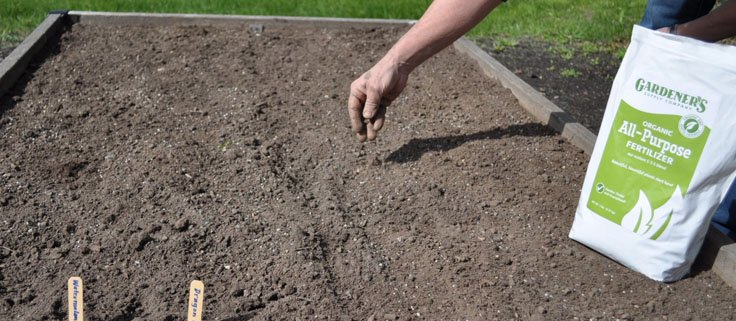Don’t let your plants go hungry
According to the Gallup Gardening Survey, less than half of the country’s home gardeners use any kind of fertilizer on their lawns or gardens. What’s unfortunate about this statistic is that it means gardeners aren’t getting as many flowers or as much produce as they should. And they’re probably struggling with disease and insect problems that could be avoided.
Well-fed plants are healthier, more productive and more beautiful. This article covers the basics of why and how to fertilize your garden.
Plant Nutrients 101
Plants need to be fertilized because most soil does not provide the essential nutrients required for optimum growth. Even if you are lucky enough to start with great garden soil, as your plants grow, they absorb nutrients and leave the soil less fertile. Remember those tasty tomatoes and beautiful roses you grew last year? It took nutrients from the soil to build those plant tissues. By fertilizing your garden, you replenish lost nutrients and ensure that this year’s plants have the food they need to flourish.
Six Primary Nutrients
There are six primary nutrients that plants require in fairly large quantities.
- carbon from CO2 in the air
- hydrogen from water
- oxygen from water and air
- Nitrogen helps plants make the proteins they need to produce new tissues. In nature, nitrogen is often in short supply so plants have evolved to take up as much nitrogen as possible, even if it means not taking up other necessary elements. If too much nitrogen is available, the plant may grow abundant foliage but not produce fruit or flowers. Growth may actually be stunted because the plant isn’t absorbing enough of the other elements it needs.
- Phosphorus stimulates root growth, helps the plant set buds and flowers, improves vitality and increases seed size. It does this by helping transfer energy from one part of the plant to another. To absorb phosphorus, most plants require a soil pH of 6.5 to 6.8. Organic matter and the activity of soil organisms also increase the availability of phosphorus.
- Potassium improves overall vigor of the plant. It helps the plants make carbohydrates and provides disease resistance. It also helps regulate metabolic activities.
Three Additional Nutrients That Matter
Plants also need these three nutrients, but in much smaller amounts:
- Calcium is used by plants in cell membranes, at their growing points and to neutralize toxic materials. In addition, calcium improves soil structure and helps bind organic and inorganic particles together.
- Magnesium is the only metallic component of chlorophyll. Without it, plants can’t process sunlight.
- Sulfur is a component of many proteins.




Leave a Reply
Want to join the discussion?Feel free to contribute!